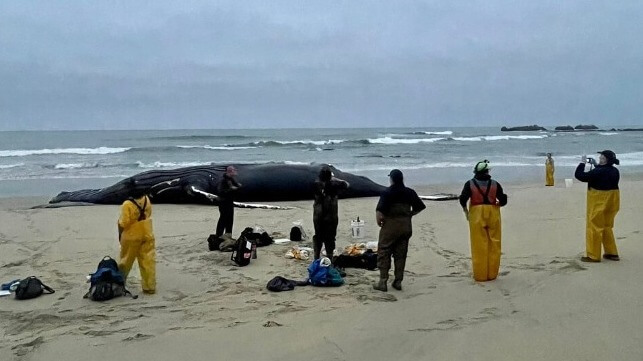West Coast's "Most Popular Whale" Killed by Ship Strike

A well-known humpback whale from coastal California, known to whalewatchers and marine biologists as "Fran," has been killed by an apparent ship strike.
"Fran" - named by an avid whalewatcher after his wife - may well have been the most popular (or at least the most photographed) whale on the West Coast. She had a unique white tail, which made her immediately identifiable, and she was known for breaching and spending time on the surface. The 49-foot whale was found on a beach at Halfmoon Bay on Monday and had spinal and skull injuries consistent with a ship strike, according to a marine biologist who participated in the autopsy.
The pattern of injury "strongly implicates blunt force trauma associated with a ship strike as this whale's cause of death," said Pádraig Duignan, director of pathology at The Marine Mammal Center of Sausalito, in a statement Tuesday.
Fran was known to whale-spotters off Mexico and California, and she returned to Monterey each year to feed. This year was the first time in many she had successfully borne a calf; the baby whale survived the incident.
According to the Marine Mammal Center, humpback whales come to the California coast to feed during the summer and the fall, then migrate south in the winter to mating grounds off Mexico. There are several initiatives to protect them from interaction with ships, including a voluntary incentive program for shipping lines to slow their vessels to 10 knots or less in the San Francisco Bay region and off Southern California. A more geographically limited voluntary initiative, Whalesafe, focuses on the approaches to Los Angeles / Long Beach.

that matters most
Get the latest maritime news delivered to your inbox daily.
Some environmentalists claim that a mandatory, legal speed limit should be created for whale habitat areas off the coast of California.
“Too many whales die from ship strikes off California, and the solution is mandatory speed limits,” said Catherine Kilduff, an attorney at the Center for Biological Diversity, in a petition earlier this year. “We know that slowing vessels down gives whales a fighting chance to avoid getting hit."
